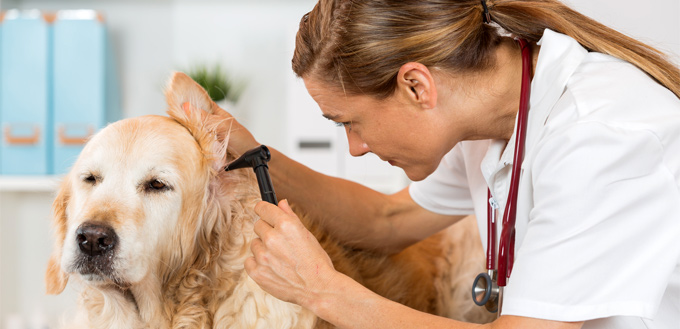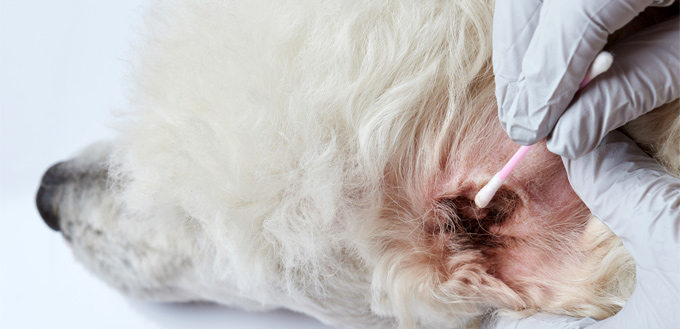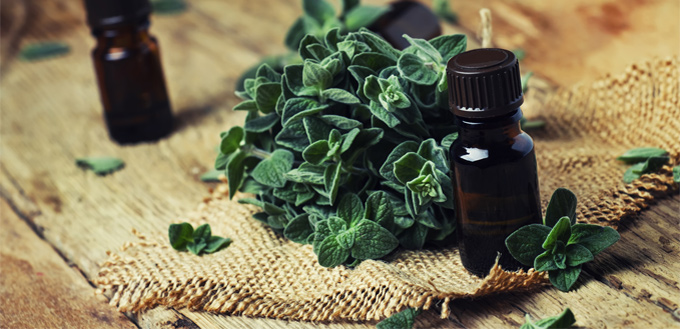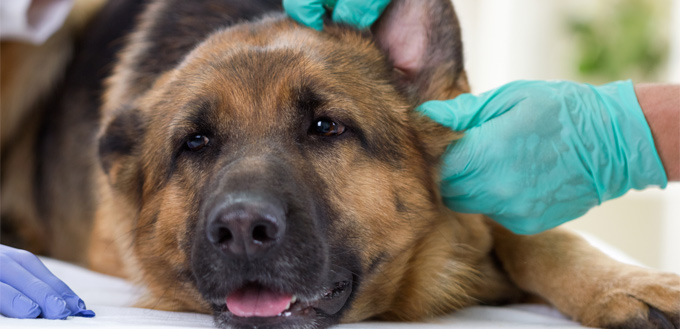Dog infections are one of the most prevalent canine health problems today, and they are infuriating because they tend to recur severally. One of the reasons behind the resistance can be attributed to the use of antibiotics in treating them. Although medicines can help, their success is often short term. They end up accelerating the existing imbalance and consequently result in more ear infections later on. That is why you should consider options of how to treat dog ear infection naturally.
What Are The Symptoms Of Dog Ear Infections?
Ear infection in the outer, middle, and inner ear:
- Scratching of the ear
- Shaking of the head
- Cocking the head to one side
- Scratching near the cheek or under the ear
- Discharge from the ear
- Rubbing the ear on objects or the ground
- Foul smell coming from the ear
Middle or inner ear infection:
- Drooling from one side of the mouth on the infected side
- Eye discharge
- Nausea or vomiting
- Unable to blink
- Leaning or falling towards the affected side
- Thick discharge from the affected ear
- Walking in circles towards the infected ear
- Dropping food out of their mouth or challenges eating
- Nerve paralysis in the face
- Pain when the infected ear is touched
- Sudden hearing loss of the infected ear
- Eyes darting back and forth
- Inflamed ear canal that may turn red

Two Types Of Canine Ear Infections
Dog ear infections might be classified into two: acute and chronic. Severe infections occur regularly and can happen because of your pup’s floppy ears or a romp in the mud. As for chronic infections, they are those that recur continuously and are usually caused by excess growth of yeast. Such infections can be treated by buying high-quality food for your dog and having allergy tests performed. Recurrent allergies can also be a symptom of thyroid imbalance, so, make sure your vet runs all the required tests.
What Causes Ear Infection In Dogs?
There are various causes of ear infections such as yeast, bacteria, hormone imbalances, and allergies.
A common myth goes that ear infections result in dogs with long, floppy ears. However, there are many dogs with floppy ears that do not get infections, so there is no way this myth can be true. Although the length might increase the risk, ear infections are merely infections; they are usually a sign of a broad issue.
- Bacterial infections
Most dog ear infections result from bacteria. Your dog has friendly and beneficial bacteria in its ears that keep off pathogenic bacteria. When this balance is upset, your canine friend is at risk because:
Bacteria from contaminated pond water might enter the ear and start colonizing because of insufficient bacteria to compete for nutrients and crowd them out.
Some bacteria residing in the ear like the staphylococcus might overgrow in the system and strain your dog’s immunity. You should consider this factor if you notice that the infections are recurring.
- Fungal or yeast infections
Fungi are also natural inhabitants of your furry friend’s ears. They live in togetherness with bacteria in the small colonies known as the microbiome. Just like it is in the case of bacteria, the yeast might also grow out of control if the dog’s immune system is not functioning optimally or if the dog has a leaky gut.
- Climatic conditions
Weather extremes such as freezing conditions, high humidity, and hot temperatures are vital contributors to dog ear problems. This is because heat and moisture create a suitable environment for bacteria to thrive. The icy weather might also result in frostbite.
- Parasites
When your dog’s ears are infested by parasites, they irritate and lead to tissue erosion and intense itchiness. The dog might thus scratch its ears excessively and inflict wounds. Mange mites, such as sarcoptic, demodectic, and otodectic mites may settle inside the ears and cause inflammation, itchiness, and hair loss. They might also lead to the buildup of wax inside the ear canal.
- Allergies
Allergies are usually linked to ear discomfort. Allergic reactions may be due to food allergies, contact allergies, and inhalant allergies. They may also be contact allergies as a result of adverse reactions to parasites like fleas.
Related Post: Best Dog Food for Allergies
- Foreign objects
Foreign objects can get into the ears and cause infections, inflammation, and irritation. Foxtails, grass awns, seeds, ticks among other plant material might cling to the skin and hair around the ear openings and work their way through the outer ear canal. It is here that they are lodged because of the canal’s L-shape.
- Canine vestibular syndrome
This is an ear infection that is prevalent to older dogs. However, it also occurs in younger animals. Although the cause is still unknown, the disease results in dizziness, balance difficulty, vomiting, and decreased appetite.
- Trauma
Mechanical trauma, whether as a result of frostbite, blunt force, too much exposure to sunlight, bite wounds, or corrosive contact with chemicals might result in an ear infection.
- Stenosis
Stenotic ear canals are usually narrower than the regular size. This increases the possibility of trapping moisture, debris, and dirt.
- Tumors
Polyps and tumors of the glands that make ear wax might cause discomfort and inflammation of the ear. This can affect balance and hearing ability adversely.
- Aural hematomas
Secondary ear problems might result if the initial cause of the ear disorder is left untreated. Most dogs that have untreated ears scratch and shake their heads in an attempt to relieve the discomfort and itchiness. This might cause physical damage to the sensitive ear tissue and result in blisters that are filled with blood. The vesicles are known as aural hematomas, and they usually occur on the ear flaps. Abscesses may also occur especially following a dogfight.

How Are Dog Ear Infections Diagnosed?
A veterinarian can quickly diagnose an ear infection by examining the eardrum and ear canal using a magnifying cone. If the infection is painful, the procedure might require sedation. The vet may analyze the ear discharge to look for parasites, yeast, and bacteria. In case the vet suspects a bacterial infection, they might send a sample of the ear discharge to the lab to know whether bacteria or virus is causing this infection. Other diagnostic tests might be conducted, such as checking for an underactive thyroid.
How To Treat Dog Ear Infection Without A Vet
If you do not live close to a vet or your dog doesn’t like being in a vet’s clinic, here are five efficient home remedies for dog ear infections.
1. Apple Cider Vinegar For Dog Yeast Infection
Apple cider vinegar has acetic acid, which is useful in removing debris and dirt from a dog’s ears. More importantly, it can also kill bacteria and yeast.
Note: If your canine friend has red, sore ears, avoid vinegar because it will be painful. Instead, try the other four home remedies.
Directions:
Buy apple cider vinegar and put it in a glass then dilute with an equal amount of water. When administering the remedy to your dog, you can either use a syringe to squirt a little of it in the ear or soak the vinegar in a cotton ball and use it to clean the ear flap.

2. Oregano Oil
This is an effective natural antibiotic. Make sure you dilute it to prevent irritation in your dog’s ears.
Directions:
Add a drop of oregano oil into ½ oz of pure Aloe Vera liquid. You can find the juice from a food store or pharmacy near you. Drop a small amount of this blend into the canine’s ears or soak it in a cotton ball then use it to clean the ear flap.

3. Coconut Oil For Dog Ear Infection
The best thing about using coconut oil for dogs is that it can manage both fungal and bacterial infections. A medical study that was conducted in 2008 approved the use of coconut oil in treating canine ear infections.
Directions:
Put two tablespoons of coconut oil in a saucepan on low heat alongside two garlic cloves for added antibacterial remedy.
Simmer until the oil becomes liquid and allow it to cool slightly. Avoid using it right away as it might be too hot for your furry friend’s ears.
Use a dropper to add three drops of the remedy inside the affected ear. You may also use a cotton ball in the mixture and use it to clean your dog’s ear.
You ought to apply this remedy in the dog’s ear twice or thrice a day for about seven days. Once the infection is apparent, you may keep some on hand and clean the ears once a week to avert future infections. However, if the dog keeps getting repeated infections, consider consulting a vet.

4. Calendula For Fungal Ear Infections
Calendula has incredible healing abilities, and it is one of the best herbs that are used to clean the external ear and local skin problems. It may be used either externally or internally, and it has excellent potential as an antifungal herb. You can also use it to relieve pain. It is found in stores as already infused oil.
Directions:
Put calendula flowers inside a glass jar and cover it using olive oil. Add a clove or two of garlic.
Ensure that the leaves have been completely covered in oil and allow the blend to sit for three or four days.
Strain and put in several drops of the warm oil into the ear canal using a dropper. You can also soak in cotton and use it to wipe your dog’s ears.
This mixture can last for a maximum of 6 months. If this is taxing, use a ready-made infusion.

5. Mullein For Bacterial Ear Infections In Dogs
It is a plant with antibacterial properties, and it’s excellent for bacterial dog ear infections. You might have a hard time buying your herbs and making your recipes, but it is quite straightforward. You can get the mullein herbs from your local drug store or order them online.
Directions:
Put mullein flowers, leaves or both in a glass jar and add olive oil. To increase its antibiotic properties, you may add a clove for every pint of oil.
Allow the blend to sit for between two to three weeks.
Now, strain and apply drops of the warm oil into the ear canal using a syringe or dropper. You may also soak some cotton balls in the mixture and rub the dog’s ears.

Foolproof Steps To Avert Ear Infections In Dogs
Ear infections can be messy, painful, stinky, and frustrating for your dog. Luckily, these steps can help you to get ahead of the causes and prevent this problem from affecting your puppy.
- Understand your dog’s risk
Although any dog can contract ear infections, some breeds are more prone than others. Characteristics such as thick hair and massive drooping ears tend to trap debris and dirt, especially in warm, dark parts of the ear canal. This creates an ideal breeding ground for bacteria and yeast. Therefore, breeds such as Springer Spaniels and Cocker are susceptible to ear infections. The Labrador is also prone to ear infections because it is allergic and loves splashing in the water.
- Feed your dog on a healthy diet that is free of allergens
Food-related allergies usually cause skin and ear-related symptoms in canines. The canals become inflamed, itchy, and red. When this happens, your dog will scratch the ears excessively and shake its head. This will disturb the natural defenses against infection and thus allows an overgrowth of bacteria and yeast. Allergy testing might also help in evaluating your dog’s triggers. Make sure to consult a doctor before making any significant changes in your dog’s diet. They can help you decide on whatever feeding mode you desire, whether raw, cooked, grain-free, or any food of choice.
- Employ parasite prevention methods
Ear mites can lead to ear infections, but they are rare in adult dogs that live indoors. The same medications that are used to guard dogs against ticks and fleas are adequate in repelling the parasites. In case ear mites are an issue to your canine friend, discuss the prevention and treatment methods with the vet.
- Check your pet’s ears regularly for odor and discharge
A healthy canine ear should be smooth, light pink, and not have any swellings. Slight smell from its ears could be an indication of a looming infection. If in doubt, consult a vet before trying to treat ears that are already infected.
- Clean the ears
If your dog’s ear is healthy but has debris or dirt in the outer folds, clean them using a product that is designed for this task, such as dog ear cleaners. That way, you will keep them free discharge and wax that cause infections. Your vet can recommend the best products to use.
Related Post: Dog Ear Cleaners
- Dry the ears after swimming or bathing
There is no need to stop your furry friend from enjoying its favorite swim as long as you dry the ears afterward. The same applies for bath time. You can use cotton swabs to dry the outer years or deodorized dog ear wipes.
You May Also Like: Dog Wipes
- Remove excess hair from the ear canals
Too much hair in the outer ear canal may act as a net to trap the debris and moisture, thus increasing the likelihood of an infection. Most professional groomers usually pluck hair as part of the dog’s hygiene routine, especially in hairy-eared breeds like the poodles and spaniels. Although the argument on whether to pluck ear hairs or not is a controversial topic, dogs that are susceptible to ear infections should have their ear hair kept short at all times.
- Consider supplements
Omega-3 fatty acids are particularly essential with regards to ear infections in dogs because they reduce inflammation and nourish the skin, which reduces the risk of infection. However, dogs that are prone to allergic reactions might react to supplements, so make sure you consult a vet first. When the dog’s immune system is not operating optimally, it might make your pet to be prone to ear infections. Therefore, you should work on creating and maintaining a healthy balance. Probiotic supplements may balance the natural bacterial flora within the digestive tract. It also promotes healthy immune responses. Remember that a healthy gut is a happy gut, and it’s also a healthy immune system.
Related Post: Probiotics for Dogs

When Should You Consult A Vet For Dog Ear Infections?
Ear infections can be painful if left untreated. The above home remedies for dog ear infections are usually adequate. However, if the problem persists, your dog could be suffering from a chronic ear infection, and you should consult a veterinarian as soon as possible.
Dog ear infections can cause a lot of agony to your dog. They can result from various reasons, such as those listed above. The treatment methods vary depending on the severity and type of infection. Coconut oil, apple cider vinegar, and essential oils such as mullein are effective home remedies for dog ear infections. The best way out is to avert infections through the methods above.
Sources:
- Dana Scott, Dog Ear Infections: Natural Remedies That Work!, Dogs Naturally
- Monica Weymouth, Natural Treatments for Ear Infections in Dogs, PetMD
Note: The advice provided in this post is intended for informational purposes and does not constitute medical advice regarding pets. For an accurate diagnosis of your pet's condition, please make an appointment with your vet.





